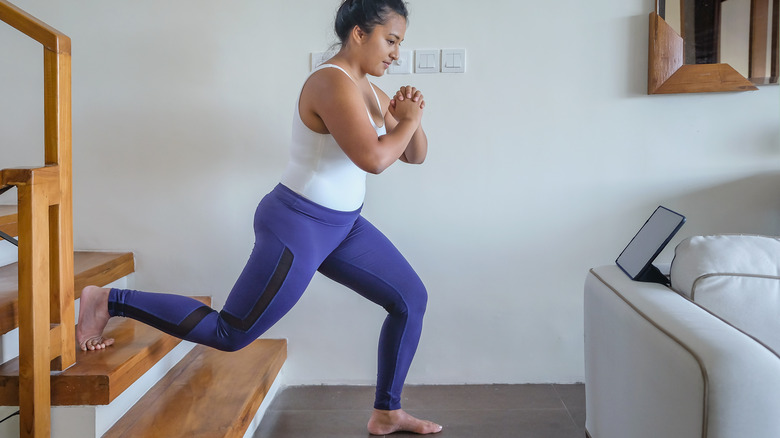This Three-Second Workout Builds Arm Strength Without Equipment
When you think of resistance training, you probably picture sweating it out at a gym filled with monstrous dumbbells and fancy-looking weight machines. While all of that is great in its own right, a 2022 study led by Masatoshi Nakamura at the Niigata University of Health and Welfare in Niigata, Japan, found that it takes only three seconds of isometric exercise targeting one's arm, done daily, to increase your arm strength over time.
The study, which was published in the Scandinavian Journal of Medicine and Science in Sports, recruited 39 sedentary yet healthy volunteers to perform arm exercises and 10 other participants to act as a control group that didn't do any resistance training, per The New York Times. The exercising group was asked to do arm workouts for three seconds at an isokinetic dynamometer, a passive device that measures one's strength, range of motion, etc. Volunteers manipulated levers with all of their might, with some doing variations of a dumbbell curl (lifting and lowering a dumbbell) and others simply holding the lever's weight in the air. This continued for three seconds a day, five days a week, and lasted an entire month.
After 60 seconds of this simple workout, researchers found that those who lifted and held the lever's weight in midair had grown their bicep strength between 6% and 7%, while those who did the dumbbell lowering motion had increased their strength by as much as 12%. Talk about uncovering an underrated arm workout you're probably not doing.
What does this mean for resistance training?
While there have been articles on doing short bursts of aerobic exercises during the day to help with cardiovascular health and overall fitness before, this is one of those rare studies where resistance training has been looked at through a similar lens.
Ken Nosaka, a professor of exercise and sports science at Edith Cowan University in Joondalup, Australia who collaborated on the study, shared that "every muscle contraction counts" (via The New York Times). Perhaps what this study has shed light on is the fact that when it comes to building strength, doing some form of weight training (whether that's body-weighted or with dumbbells) is better than doing nothing. It is important to note, however, that the research focused on bicep strength alone. Lower body strength was not measured with a similar exercise routine.
When the bustle of life sometimes prevents dedicating one or more hours a day, three-four times a week, at a fully-equipped gym to work out and keep consistent with this habit, studies of this nature offer a sense of hope that you can build strength from within the comfort of your home, with no equipment and very little time dedicated to the process. After all, there are plenty of arm workouts you can do without weights that can still build muscle strength over time.
The power of fitting little pockets of exercise into your day
There is an appeal to fitting exercise into your regular routine. A lot of us spend our days rushing from one commitment to another, so it makes sense to fit small spurts of workouts or even just one small pocket of exercise time each morning to make sure you stay consistent.
Matthew Stork, a health research postdoctoral fellow at the University of British Columbia's School of Health and Exercise Sciences, told The University of British Columbia Beyond that there's definite value in this principle. "There's a host of things coming together that's making it more challenging to get physical activity." Dedicating as little as 20 seconds to a minute of your day to engage in some form of exercise — aerobic, HIIT, yoga, stretching, or resistance training — is better than doing nothing at all. While the study focused on three seconds, increasing this time to encompass even 10 minutes daily can do a lot for muscle strength overall.
Canadian fitness expert John Little, who's written about the benefits of short bursts of exercise (more specifically, 12 minutes of exercise a week) in his book "The Time-Saver's Workout," told the New York Post, "The advice that we've been told is to be more active. But sales of treadmills have never been better, and obesity has never been worse." Perhaps it's just important that we start somewhere, however small, before we think of adding hours and hours toward working out each week.



